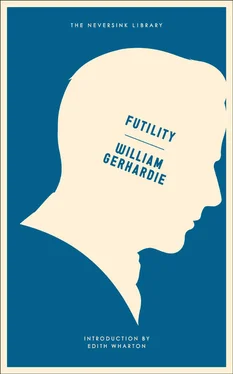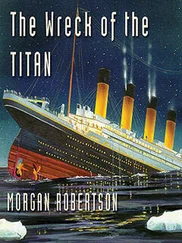William Gerhardie
Futility
WILLIAM GERHARDIE(1895–1977) was born Gerhardi — he added the final “e” late in life — in St. Petersburg, Russia, the son of British parents who owned a cotton mill there. At 17 they sent him to a British vocational college to prepare him for joining the family business. However Gerhardi disliked the school and at the outbreak of World War I enlisted instead. His language skills led to assignment to the British Mission in Siberia, to work on a propaganda campaign aimed at disrupting the Bolshevik take-over of the country after the Russian Revolution (which had ruined his family and forced them to flee the country). Gerhardie’s work earned him an Order of the British Empire at age 24. Upon his return to England, he enrolled at Oxford and soon produced his first novel, Futility , based on his recent experience in Russia. The book won praise from Evelyn Waugh, H.G. Wells, George Bernard Shaw, Edith Wharton, Graham Greene and others — yet did not sell well. While still at school he wrote a critical biography of Chekhov, the first such appreciation of the writer in English, and still cited by scholars as one of the most perceptive. Several critically praised novels followed, including The Polyglots, Doom , and Pending Heaven , and he became the toast of literary London. He was especially doted upon by press magnate Lord Beaverbrook, who tried, unsuccessfully, to increase Gerhardie’s sales by serializing his books in his newspapers. In 1939 Gerhardie stopped publishing, although for the rest of his life he told friends he was working on a novel called This Present Breath , a tetralogy in one volume. Falling into poverty, he rarely left his London apartment, and when he died there in 1977, no trace of This Present Breath was found.
EDITH WHARTON(1862–1937), the first woman to win a Pulitzer Prize, was the author of more than twenty novels, including The House of Mirth, Ethan Frome , and The Age of Innocence .
I was by no means the only reader of books on board the Neversink. Several other sailors were diligent readers, though their studies did not lie in the way of belles-lettres. Their favourite authors were such as you may find at the book-stalls around Fulton Market; they were slightly physiological in their nature. My book experiences on board of the frigate proved an example of a fact which every book-lover must have experienced before me, namely, that though public libraries have an imposing air, and doubtless contain invaluable volumes, yet, somehow, the books that prove most agreeable, grateful, and companionable, are those we pick up by chance here and there; those which seem put into our hands by Providence; those which pretend to little, but abound in much. — HERMAN MELVILLE, WHITE JACKET
There are few novelists nowadays, I suppose, who will not readily acknowledge that, in certain most intrinsic qualities of the art, the great Russians are what Henry James once called Balzac, the masters of us all. To many readers of the western world, however, there was — there still is, despite the blinding glare which the Russian disaster has shed on the national character — a recurring sense of bewilderment in trying to trace the motives of the strange, seductive and incoherent people who live in the pages of Dostoievsky, Tolstoi, and their mighty group. In Balzac, at all times, the western mind is at home: even when the presentment is obviously a caricature, one knows what is being caricatured. But there are moments — to me at least — in the greatest of Russian novels, and just as I feel the directing pressure of the novelist most strongly on my shoulder, when somehow I stumble, the path fades to a trail, the trail to a sand-heap, and hopelessly I perceive that the clue is gone, and that I no longer know which way the master is seeking to propel me, because his people are behaving as I never knew people to behave. “Oh, no; we know they’re like that, because he says so — but they’re too different!” one groans. And then, perhaps, for enlightenment, one turns to the western novelist, French or English or other, the avowed “authority” who, especially since the war, has undertaken to translate the Russian soul in terms of our vernacular.
Well — I had more than once so turned … and had vainly hunted, through the familiar scenery of vodka, moujik, eikon, izba and all the rest, for the souls of the wooden puppets who seemed to me differentiated only from similar wooden puppets by being called Alexander Son-of-Somebody instead of Mr. Jones or M. Dupont.
Then I fell upon “Futility.” Some one said: “It’s another new novel about Russia”—and every one of my eager feelers curled up in a tight knot of refusal. But I had a railway-journey to make, and the book in my bag — and I began it. And I remember nothing of that railway-journey, of its dust, discomfort, heat and length, because, on the second or third page, I had met living intelligible people, Sons-and-daughters-of-Somebody, as Russian, I vow, as those of Dostoievsky or Goncharoff, and yet conceivable by me because presented to me by a mind open at once to their skies and to mine. I read on, amused, moved, absorbed, till the tale and the journey ended together.
This, it seems to me, is the most striking quality of Mr. Gerhardie’s book: that he has (even in this, his first venture) enough of the true novelist’s “objectivity” to focus the two so utterly alien races to which he belongs almost equally by birth and bringing-up — the English and Russian; to sympathize with both, and to depict them for us as they see each other , with the play of their mutual reactions illuminating and animating them all.
There are lots of other good things in the book; indeed, it is so surprisingly full of them that one wonders at the firmness of the hand which has held together all the fun, pathos and irony of the thronged sprawling tale, and guided it resolutely to an inevitable conclusion. “It takes genius to make an ending” Nietzsche said; and, perhaps partly for that reason, the modern novelist seems often to have decided that it is the trifle most conveniently dispensed with.
Mr. Gerhardie’s novel is extremely modern; but it has bulk and form, a recognizable orbit, and that promise of more to come which one always feels latent in the beginnings of the born novelist. For all these reasons — and most of all for the laughter, the tears, the strong beat of life in it — I should like to hand on my enjoyment of the book to as many other American readers as possible.
EDITH WHARTON.
PART I. THE THREE SISTERS
[The “I” of this book is not me.]
I
AND THEN IT STRUCK ME THAT THE ONLY THING TO do was to fit all this into a book. It is the classic way of treating life. For my ineffectual return to Vladivostok is the effectual conclusion of my theme. And the harbour has been strangely, knowingly responsive. It has sounded the note of departure, and the tall stone houses of the port seem to brood as I walk below, and “set the tone.” And because of this and the sense that I am marking time till the big steamer comes and bears me home to England I am eagerly retrospective.…
When the Simbirsk , of the Russian Volunteer Fleet, had at last completely vanished, carrying away the three sisters to Shanghai, I came back to my room at the hotel. I had just moved in there. It was a bare and dingy room in a small and shabby hostel. A bed was eventually provided, but in lieu of bed-sheets I was to lie on a dirty table-cloth which was to serve again as table-cloth next morning when I had my breakfast. “Is this sheet clean?” I asked.
Читать дальше












